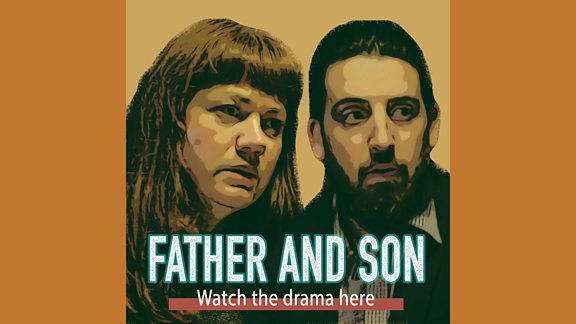Session 11
Watch our new crime drama, Father and Son and then learn more about the people involved with the making of it.
Session 11 score
0 / 0
- 0 / 0Activity 1
- 0 / 0Activity 10
- 0 / 0Activity 2
- 0 / 0Activity 3
- 0 / 0Activity 4
- 0 / 0Activity 5
- 0 / 0Activity 6
- 0 / 0Activity 7
- 0 / 0Activity 8
- 0 / 0Activity 9
Activity 7
Father and Son: Meet Nigel!
Nigel Thomas plays Paul in our crime drama. Paul is the half-brother of missing man, Jamie Phelps. Find out about why he wanted to be an actor, and much more....
Watch the video and complete the activity

Hello, my name is Nigel Thomas. I'm playing the role of Paul.
He's my brother. Look, is this going to take long?
I think the first time I knew was probably when I was at school. I was... must have been about four and it was the Nativity play and I was playing the donkey, holding up the donkey face. And it was the rapturous applause – I think I knew then that I wanted to be an actor. I've been doing it pretty much ever since.
I really enjoy playing Christian in Cyrano de Bergerac. He was a very interesting character; he was meant to be very shallow, but I think there was a lot... a lot more to him than... than just his... than just his shallowness.
The most challenging role was probably playing Puck in A Midsummer Night's Dream, because it's such a famous role. Shakespeare – anything you do, people have seen it so many times, so you have to try and bring something new and something that... part of your own being, I think, to the role. So, I really enjoyed doing that and putting a bit of my own personality in there, which hopefully people hadn't seen before.
I think firstly you have to read everything very carefully and get as much information from the page as you can, and then work out if there is a back story to that. You've got the basis of the information there, but then there's a whole world of history that you don't have on the page, and you have to work with the director and often the other cast to... to give him that... or her that, sort of, broad back story, and then that gives it a whole life that isn't necessarily on the page as well. So, once you have that history, you can incorporate that into the performance and give him a bit more depth than you might originally see on the page
I always think in a script, it's important that basic things like spelling and grammar are correct. I don't think necessarily English has to be... it doesn't have to be flowery or necessarily extravagant English, but I think as long as the basics are there – because then you know that the person writing it has put that amount of effort in. If they've done enough effort to get basic spelling right and do a spell-check, then you know that they've also probably put in effort in the construction of the piece as a whole. So that, I think, is the very first sign of a... of a good script – is the... it's, yeah, basically spelt properly.
I think the voice is... it's a muscle and it's like... like any other muscle, you need to keep it... you need to practise, so I think warming up is useful. The same kind of warm-ups... you could do singing – can be useful. And for some scripts, you're going to be talking for quite a long period of time throughout the day, so a warm-up is helpful. Having a nice warm drink as well. My singing teacher used to recommend a spoonful of honey occasionally – just to, sort of, coat it. Jelly beans as well are apparently... because it's jelly and that's... that's quite useful as well. But don't have too many, because they're bad for you.
The best trick I have for learning lines is to sit down, focus and go over them again, and again, and again. I don't think there's any – necessarily any kind of shortcut, unless you're lucky enough to have photographic memory. Ensuring you have the time and space to do it, and leaving yourself enough time to learn the lines and just keep going through it, and going through it, and going through it. I think it is something that, once you do a few times with a few scripts – it probably does get easier. Your brain, kind of, learns how to... how to memorise lines. Other than that, there is no easy solution really: you just have to put in the effort and then you'll get the results and it... it will be worth it for you.
I think my favourite actor is probably Gene Wilder. I'm not sure I can imitate... I'd love to be able to imitate him properly but it's.. I think it is the way he uses his eyes and the pauses that he – it's a kind of cliché to say pausing and acting is the best thing, but the way he does it – he doesn't completely pause: there are, sort of, eye movements and... and just a little hint of a smile. It really brings a lot to, especially, comedy. So, I'd say he's my hero. Maybe one day I'll be able to... do that as well as he does it.
